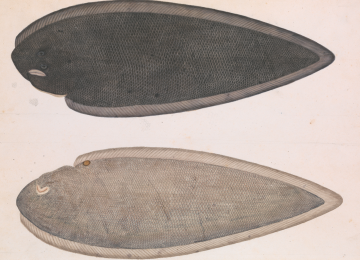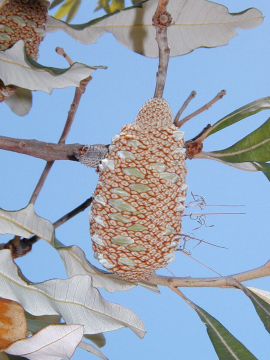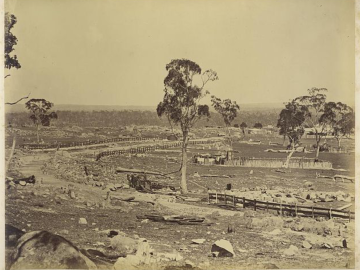Water Myths
Kathryn Fry
i
Women on plastic chairs shift in the sand
as the scientist lifts the box to their table.
Mungo Lady brought back, safe in country;
a breeze rustles her spirit home.
They spread her cracked, charred bones
on the velvet lining and cry the same tears
of forty thousand years before—and this,
the first cremation for our world to know.
She’s not your ancestor, the archaeologist said.
We’ve always been here, they said. She surfaced
for a reason. If you find something, bury it deeper.
They found Mungo Man, arthritis in his bones.
But right here, right now, the wind cuts
to my core, carves down the lunette it once
shaped from fossil lakes after the old Lachlan
and Willandra Creek and the plenty ended.
The ranger crouches by an ancient fireplace,
tells of shellfish middens and golden perch
near a shingleback sleeping by the track, emus
out there and somewhere a singing honeyeater.
ii
In eighteen sixty-one
near the rugged stone in Mutawintji Gorge
Ludwig Becker sat certain as the spindly cypress.
His pen in sepia ink, he sketched the rocks
(where thousands met in thousands of years)
and the pool then deep and clear in its bed.
Some touchstone to hold onto
in his final months on the long trek north.
Here now, we see the stencils he noted:
prints in red, yellow and white, all sizes,
left hands. Beyond the cooking pits
in the Historic Site, chiselled into slabs
of dry rock: old story surfacing in camps
and tracks, an emu, a ceremonial headdress.
Around them, mulga and dead finish acacias
hanging on.
iii
There are no limits on the road to
Pooncarie, out with the pearl bluebush
in the spread of land that flows all the way
to greet the sky like some vast ocean of soul.
And Menindee’s dry for Broken Hill, too far
south for summer rain, too far north for winter’s.
Nine lakes empty. How life aches and asks,
how much liquid lies under for the bores?
Towns blame one another for water loss.
Someone curses the drought and someone
the Authority and someone the crops way north.
By the unsealed road, all the lambs are twins.
Mallee trunks lean about in the bulldust. And clover
floods the waterless basin of the Great Anabranch.
Across the Darling, black cormorants peg boughs,
their throats silent over the river’s wan run.
On the verandah of the old homestead
our guide bends for his boots; we amble
around the drop-log quarters and sheds
as he brings the past forward.
Thirty hands once on this station, campers and over-
night rooms now. His city memories crowd
the walls of wood panels in the breakfast room.
Out there, she points to the floodplain,
when the muso settled his sax at our concert’s end,
you should have heard the birds begin.
Country has become them both
as if they’ve known it all their lives.
And us.
She gathers oranges in morning frost,
fills the jug to toast the sun in the river red gums
in their paradise.


